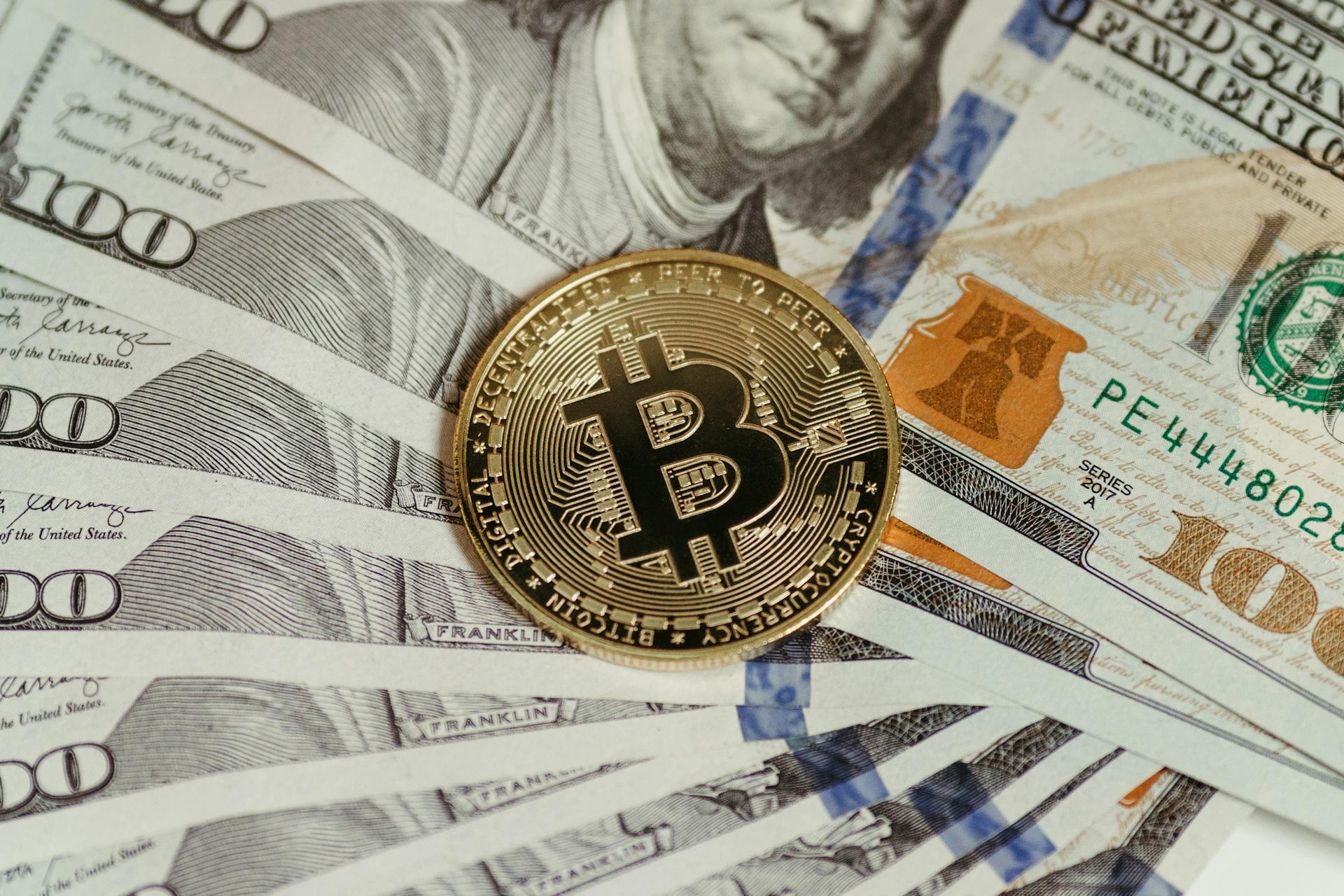
As governments around the world grapple with how to regulate cryptocurrencies, we're seeing a diverse range of approaches emerge.
The EU's MiCA regulation, for example, is designed to create a harmonized regulatory framework for crypto assets across the bloc.
In the US, the Securities and Exchange Commission (SEC) has been actively pursuing enforcement actions against companies it deems to be operating unregistered security token exchanges.
China has taken a more restrictive approach, banning cryptocurrency trading and initial coin offerings (ICOs) in 2017.
The People's Bank of China has also launched a blockchain-based digital currency, the Digital Currency Electronic Payment (DCEP), which is currently in pilot testing.
If this caught your attention, see: China Coin Crypto
Regulatory Framework
The regulatory framework surrounding cryptocurrencies is complex and constantly evolving. The SEC has taken a proactive approach to regulating cryptocurrencies, with SEC Chair Gary Gensler stating that some major crypto exchanges "are likely trading securities" and thus need to register with the SEC.
In 2022, the SEC increased the size of its Cyber Unit by 66%, from 30 to 50 officials, and renamed it the Crypto Assets and Cyber Unit as it expanded its crypto enforcement efforts. This move suggests a growing recognition of the need for robust regulation in the cryptocurrency space.
Cryptocurrencies are considered securities if they meet the Howey test, which was established in a 1946 Supreme Court case about orange groves. This test holds that a contract falls under the SEC's jurisdiction if someone invests "money in a common enterprise and is led to expect profits solely from the efforts of the promoter or a third party."
The SEC has a broad set of regulatory tools that can be tailored to address cryptocurrencies' unique characteristics and challenges. These tools include registration requirements, disclosure standards, anti-fraud and price manipulation measures, and investor education and protection initiatives.
Here are some potential SEC actions on crypto, which could help address the regulatory challenges facing the industry:
- Registration requirements: Mandate the registration of cryptocurrency exchanges and tokens.
- Disclosure standards: Establish robust transparency rules to confirm that crypto enterprises give investors comprehensive and accurate information.
- Anti-fraud and price manipulation measures: Enforce anti-fraud measures to deter deceptive practices and safeguard the integrity of the crypto markets.
- Investor education and protection initiatives: Broaden efforts to apprise investors of the unique risks associated with cryptocurrencies.
- Cybersecurity regulations: Impose rigorous cybersecurity regulations on crypto platforms to protect against hacks and data breaches.
- AML and CTF regulations: Collaborate with other regulators to enforce AML and CTF regulations to address public security concerns about cryptocurrencies.
- Market surveillance: Monitor trading activities to detect irregular activities early and enforce a fair and transparent market.
- Global regulatory cooperation: Forge alliances with international regulators to create coordinated regulations and tackle cross-border crypto crimes.
- Innovation-friendly regulations: Adopt a balanced regulatory approach that encourages innovation while protecting investors and market integrity.
- Clearer tax guidelines: Provide more straightforward policies on taxing crypto transactions with guidance from the Internal Revenue Service and state tax authorities.
The IRS has also taken steps to regulate cryptocurrencies, considering them as property and requiring individuals to declare them when filing for taxes. The IRS has issued guidelines on taxing cryptocurrencies, including requiring individuals to report gains or losses associated with the sale of cryptocurrency.
Financial Crimes
Financial crimes are a significant concern in the cryptocurrency space, and regulatory bodies are taking steps to address these issues.
Data theft and financial fraud are pressing concerns surrounding cryptocurrencies, with a researcher at Cornell University identifying a serious security flaw in the Ethereum blockchain that put $250 million at risk of theft in 2017.
Cryptocurrencies have been used for "dark-market sites", where criminals can buy and sell illegal items with little chance of being identified, and various governmental agencies have labeled drug dealers that exchange drugs for cryptocurrency as the "new generation of criminals." In 2019, blockchain analytics firm Chainalysis estimated that criminal entities transacted $2.8 billion in Bitcoin exchanges, up from around $1 billion in 2018.
The SEC is taking a closer look at cryptocurrencies, with Chair Gary Gensler stating that some crypto exchanges "are likely trading securities" and thus need to register with the SEC. The SEC has also increased the size of its Crypto Assets and Cyber Unit by 66%, from 30 to 50 officials, and renamed it the Crypto Assets and Cyber Unit as it expanded its crypto enforcement efforts.
Here are some potential SEC actions on crypto:
- Registration requirements
- Disclosure standards
- Anti-fraud and price manipulation measures
- Investor education and protection initiatives
- Cybersecurity regulations
- AML and CTF regulations
- Market surveillance
- Global regulatory cooperation
- Innovation-friendly regulations
- Clearer tax guidelines
AML Compliance Manual
Criminal organizations have found new ways to commit financial crimes using cryptocurrencies, which provide a level of anonymity that can be exploited for illicit activities.
Cryptocurrencies have been used for "dark-market sites", where criminals can buy and sell illegal items with little chance of being identified.
The use of cryptocurrencies for financial crimes is a growing concern, with Chainalysis estimating that criminal entities transacted $2.8 billion in Bitcoin exchanges in 2019.
This is a significant increase from 2018, when criminal entities transacted around $1 billion in Bitcoin exchanges.
To convert their illegally acquired cryptocurrency into cash, criminals often use over-the-counter trading (OTC) to circumvent anti-money-laundering rules.
The SEC requires cryptocurrencies to be registered as an investment if they meet certain criteria, such as being offered to institutional investors.
Cryptocurrencies that meet these criteria are subject to SEC regulation, which helps to prevent financial crimes.
By understanding the risks associated with cryptocurrencies, compliance teams can develop effective strategies to prevent financial crimes and protect their organizations.
Explore further: What Credit Cards Allow Crypto Purchases
State of Financial Crime 2024
In 2019, blockchain analytics firm Chainalysis estimated that criminal entities transacted $2.8 billion in Bitcoin exchanges, up from around $1 billion in 2018.
Cryptocurrencies have been used for "dark-market sites", where criminals can buy and sell illegal items with little chance of being identified.
The anonymity provided by cryptocurrencies makes them an attractive tool for money laundering and other financial crimes. A researcher at Cornell University identified a serious security flaw in the Ethereum blockchain that put $250 million at risk of theft in 2017.
To combat financial crimes, regulatory bodies such as the SEC have a range of tools at their disposal. The SEC could mandate the registration of cryptocurrency exchanges and tokens, establish robust transparency rules, and impose anti-fraud measures to deter deceptive practices.
Cryptocurrency exchanges are subject to anti-money-laundering rules that require firms to identify their customers. However, Chainalysis researchers suggested that criminals have found a way to circumvent these rules using over-the-counter trading (OTC).
Intriguing read: Chainalysis Crypto Crime Report
The SEC's potential actions on crypto include investor education and protection initiatives, cybersecurity regulations, and market surveillance. These measures could help protect investors and the integrity of the crypto markets.
A total of 1 million email addresses were compromised in a data security breach by crypto wallet maker Ledger, putting the personal information of 9,500 customers at risk. This highlights the need for robust cybersecurity regulations in the crypto space.
The SEC could also collaborate with other regulators to enforce anti-money-laundering and counter-terrorism financing regulations, which could help address some of the public security concerns about cryptocurrencies.
Here are some potential SEC actions on crypto:
- Registration requirements
- Disclosure standards
- Anti-fraud and price manipulation measures
- Investor education and protection initiatives
- Cybersecurity regulations
- AML and CTF regulations
- Market surveillance
- Global regulatory cooperation
- Innovation-friendly regulations
- Clearer tax guidelines
Money Laundering
Money laundering is a significant concern in the financial world, and cryptocurrencies have been criticized for enabling it. Several commentators suggest that cryptocurrencies provide criminal organizations with a new way to commit fraud, money laundering, and other financial crimes.
Cryptocurrencies have been used for "dark-market sites", where criminals can buy and sell illegal items with little chance of being identified. In fact, various governmental agencies have labeled drug dealers that exchange drugs for cryptocurrency as the "new generation of criminals."
A different take: How to Find New Crypto Coins Early
Criminals have found ways to circumvent anti-money-laundering rules using over-the-counter trading (OTC). Chainalysis researchers estimated that criminal entities transacted $2.8 billion in Bitcoin exchanges in 2019, up from around $1 billion in 2018.
The Financial Crimes Enforcement Network (FinCEN) considers cryptocurrency exchanges to be money transmitters, as cryptocurrency tokens are "other value that substitutes for currency."
Take a look at this: How to Make Money on Crypto Currency
SEC Enforcement Reasons
The SEC is cracking down on cryptocurrencies, and for good reason. SEC Chair Gary Gensler has said that some crypto exchanges are likely trading securities and need to register with the SEC.
The SEC wants to increase protections for investors, keep markets stable, and bring more transparency to the rapidly evolving digital landscape. Regulators are working to address the unique characteristics and challenges of cryptocurrencies.
Some of the major reasons for SEC enforcement of cryptocurrencies include the potential for fraud and price manipulation. The SEC has a broad set of regulatory tools that can be tailored to address these issues.
Consider reading: Bitcoin Address Example
Cryptocurrencies come under the SEC's authority if they meet the Howey test, which was established in a 1946 Supreme Court case about orange groves. This test determines whether a contract falls under the SEC's jurisdiction if someone invests money in a common enterprise and is led to expect profits solely from the efforts of the promoter or a third party.
The SEC has increased the size of its Cyber Unit by 66%, from 30 to 50 officials, and renamed it the Crypto Assets and Cyber Unit as it expanded its crypto enforcement efforts.
Investor Protection
Investor Protection is a top priority in the world of cryptocurrency. Fraud prevention is crucial to protect investors from bad actors.
By regulating crypto markets under securities laws, the SEC is hoping to make these enterprises provide more accurate and thorough information to the public, enabling investors to make more informed decisions. This is a significant step in promoting transparency and accountability.
The SEC enforcement could deter fraud and protect investors from bad actors, which is essential for building trust in the crypto market.
Tax Implications
Tax implications can be a real headache for investors. Cryptocurrencies are considered property, not currency, for US federal income tax purposes.
This means you can't use cryptocurrency as a functional currency for tax purposes. You'll need to report transactions involving cryptocurrencies in US dollars on your annual tax return.
You'll have to determine the fair market value of your cryptocurrencies by converting them into US dollars on each transaction date. This can be a tedious process, especially if you're not used to tracking your cryptocurrency transactions.
As a capital asset, cryptocurrencies are subject to capital gains taxes on any profits you realize. This applies whether you bought your cryptocurrency from the US or another country.
You'll need to keep records of the price at which you bought and sold your cryptocurrencies to report your gains accurately. This can be a challenge, especially if you've made multiple transactions over time.
The rules for reporting cryptocurrency transactions on foreign exchanges are still unclear, so it's essential to consult with a tax professional to ensure you're meeting all your tax obligations.
You might like: Ripple Price Australian Dollars
Investor Protection
Fraud prevention is a significant concern in the cryptocurrency market, which is still relatively new and has been associated with many scams and frauds. The SEC's enforcement could deter fraud and protect investors from bad actors.
By regulating crypto markets under securities laws, the SEC is hoping to make these enterprises provide more accurate and thorough information to the public. This would enable investors to make more informed decisions.
This is crucial because investors often don't have a clear understanding of the risks involved in investing in cryptocurrencies. In fact, many investors have lost significant amounts of money due to lack of information and oversight.
To better understand the potential risks and benefits of investing in cryptocurrencies, investors should be aware of the following:
- Fraud prevention: SEC enforcement could deter fraud and protect investors from bad actors.
- Disclosure standards: Regulated crypto markets would provide more accurate and thorough information to the public.
Market Integrity
Market Integrity is a top concern for regulators in the crypto space. The anonymity and lack of regulation in cryptocurrency markets make them susceptible to manipulative practices.
Price manipulation is a significant issue, with SEC oversight potentially helping to curb such practices and secure fair prices. In fact, the SEC could play a crucial role in maintaining market integrity and investor trust.
Market surveillance is also essential in detecting unusual activities and preventing market manipulation. This can be achieved through monitoring the crypto markets for suspicious behavior.
Regulators need to strike a balance between innovation and consumer protection to maintain market integrity. By implementing effective regulations, they can foster a safer and more trustworthy environment for investors.
Here are some key areas where regulations can help maintain market integrity:
- Price manipulation: SEC oversight to curb manipulative practices
- Market surveillance: Monitoring for unusual activities
Country-Specific Regulations
In the United States, cryptocurrencies are not considered legal tender, but exchanges are legal, with regulation varying by state. The Internal Revenue Service (IRS) defines cryptocurrencies as a digital representation of value that functions as a medium of exchange, a unit of account, and/or a store of value.
The IRS requires individuals to declare cryptocurrency as property on tax returns and report gains or losses associated with its sale. In 2018, the IRS issued a press release reminding individuals of this requirement and announcing an investigation team to focus on crimes involving cryptocurrencies.
On a similar theme: Sui Crypto Currency Value
Canada has been proactive in regulating cryptocurrencies, primarily under provincial securities laws. Cryptocurrencies are not legal tender in Canada, but exchanges are legal and must register with the Financial Transactions and Reports Analysis Centre of Canada (FinTRAC) after June 1, 2020.
Here's a quick rundown of some key countries' cryptocurrency regulations:
Europe
Europe has taken a progressive stance on cryptocurrency regulations, with many countries adopting a friendly and innovative approach. In Switzerland, cryptocurrencies are legal and accepted as payment in some contexts, with a registration process in place for cryptocurrency exchanges. These exchanges must obtain a license from the Swiss Financial Market Supervisory Authority (FINMA) to operate.
Switzerland's government has also approved a motion to adapt existing financial regulatory provisions to include cryptocurrencies, and the country has introduced the Distributed Ledger Technology (DLT) Act to adjust Swiss laws to take advantage of cryptocurrency innovation.
Luxembourg has a similarly progressive approach, with no specific cryptocurrency regulations in place but a legislative attitude that is generally favorable. Cryptocurrency exchanges in Luxembourg are regulated by the Commission de Surveillance du Secteur Financier (CSSF) and must obtain a payments institutions license to trade.
Here's an interesting read: Crypto Mining Regulations
In Estonia, cryptocurrency exchanges are legal and must register with the Financial Intelligence Unit, with strict reporting and KYC rules in place. Estonia has also introduced legislation tightening licensing requirements and has asserted that virtual currency service providers will be treated the same as financial institutions under the Money Laundering and Terrorist Financing Prevention Act.
Malta has taken a very progressive approach to cryptocurrencies, positioning itself as a global leader in crypto regulation. Cryptocurrency exchanges are legal in Malta and the country has introduced landmark legislation that defines a new regulatory framework for cryptocurrencies and addresses AML/CFT concerns.
Here's a brief overview of the regulatory landscape in these European countries:
Each of these countries has its own unique approach to cryptocurrency regulation, but they all share a commitment to innovation and progress in the space.
IRS Approach
In 2014, the IRS decided that cryptocurrency qualifies as property for tax purposes, requiring it to be declared when filing taxes. This means that any gains or losses from cryptocurrency transactions must be reported.
The IRS considers cryptocurrency to be a medium of exchange, a unit of account, and/or a store of value, and has issued tax guidance accordingly. This classification affects how cryptocurrency is taxed, and individuals must include its fair market value when calculating gross income.
The IRS issued a press release in 2018 to remind individuals that cryptocurrencies are reportable on income tax returns and to announce the establishment of an investigation team to focus on crimes involving cryptocurrencies. This reminder reinforced the 2014 Notice, which stated that taxes are owed on all realized gains of cryptocurrency in certain situations.
The IRS's first real implementation of regulatory authority was in 2016, when it filed a summons to Coinbase, a popular cryptocurrency exchange, asking for information on a certain amount of users. Coinbase initially refused to respond but ultimately complied with the order and turned over records of customers between 2013 and 2015.
Intriguing read: Coinbase vs Coinbase Pro
United States
The United States has a complex regulatory environment for cryptocurrencies, with different agencies having varying degrees of involvement. The Internal Revenue Service (IRS) views cryptocurrencies as property, requiring them to be declared on tax returns and subject to applicable tax requirements.
The IRS has issued guidance on cryptocurrency taxation, including the requirement to disclose and describe virtual currency transactions and report gains or losses associated with the sale of cryptocurrency. In 2018, the IRS announced the establishment of an investigation team to focus on crimes involving cryptocurrencies.
The Financial Crimes Enforcement Network (FinCEN) considers cryptocurrency exchanges to be money transmitters, and the SEC views cryptocurrencies as investment contracts and securities. The court found Bitcoins to be “investment contracts” and “securities” for purposes of federal security law in a 2013 case.
Cryptocurrency regulations vary by state in the US, with some states having more lenient regulations than others. The IRS does not consider cryptocurrencies to be legal tender, but defines them as “a digital representation of value that functions as a medium of exchange, a unit of account, and/or a store of value.”
Intriguing read: Crypto Mining Taxes
Here's a summary of the key agencies involved in cryptocurrency regulation in the US:
Overall, the US regulatory environment for cryptocurrencies is still evolving, with different agencies having varying degrees of involvement and different states having different regulations.
Australia
Australia has been a progressive country in its implementation of cryptocurrency regulations. The government declared that cryptocurrencies are legal and should be treated as property, subject to Capital Gains Tax (CGT).
In 2018, the Australian Transaction Reports and Analysis Centre (AUSTRAC) required exchanges operating in Australia to register, identify and verify users, maintain records, and comply with government Anti-Money Laundering/Counter-Terrorism Financing (AML/CFT) reporting obligations.
Unregistered exchanges are subject to criminal charges and financial penalties. This shows the importance of following regulations to avoid legal issues.
The Australian Securities and Investments Commission (ASIC) issued updated regulatory requirements for initial coin offerings (ICOs) and cryptocurrency trading in May 2019. These requirements aim to provide a clear framework for crypto businesses to operate.
Expand your knowledge: Australian Dollar Currency Today
In August 2020, Australian regulators forced many exchanges to delist privacy coins, a specific type of anonymous cryptocurrency. This demonstrates the country's continued effort to regulate the crypto market.
Australia is moving to increase its regulation of cryptocurrency exchanges. A new licensing framework is planned to be introduced, with a consultation period scheduled for 2022.
India
India has a murky status when it comes to cryptocurrency exchanges, with new regulations being considered.
Cryptocurrencies are not legal tender in India, and the tax status of cryptocurrencies is unclear, with finance minister Bhagwat Karad indicating in February 2022 that cryptocurrency transactions could face a 30 percent tax.
In 2018, the Reserve Bank of India banned banks and regulated financial institutions from dealing with or settling virtual currencies, prohibiting the trade of cryptocurrencies on domestic exchanges.
The ban was later ruled unconstitutional by the country's Supreme Court in 2020, allowing exchanges to reopen.
A leaked draft bill in 2019 suggested a blanket ban on cryptocurrencies, with prison sentences for individuals who engage in cryptocurrency activities.
For your interest: Crypto Exchange Ban in India
However, the Indian government has also proposed the creation of an official digital currency, which would be exempt from the ban.
In 2021, a study revived the legislative push to prohibit private cryptocurrencies, except for virtual currencies issued by the state.
The Indian Minister of State for Finance suggested that a new cryptocurrency bill would be forthcoming, but as of February 2022, the bill has not been approved by Lok Sabha, leaving the legislative status of cryptocurrencies unclear.
The Standing Committee on Finance met with representatives of crypto exchanges in November 2021 and concluded that cryptocurrencies should be regulated rather than banned.
A different take: Finance Coin Crypto
Latin America
Latin America has a diverse range of regulations, but one thing is clear: data protection laws are on the rise. In Brazil, for example, the General Data Protection Law (LGPD) was enacted in 2018 and came into effect in 2020.
The LGPD requires companies to obtain explicit consent from individuals before collecting and processing their personal data. This includes data related to health and financial information.
In Mexico, the Federal Law for the Protection of Personal Data in Possession of Private Parties (LFPDPPP) has been in effect since 2010. This law requires companies to inform individuals about the collection and use of their personal data.
Mexico's law also grants individuals the right to access, rectify, cancel, and oppose the use of their personal data. This is a significant right, as it allows individuals to take control of their own data.
Argentina has the Personal Data Protection Law (PDPL), which requires companies to implement data protection policies and procedures. This includes appointing a data protection officer and providing training to employees.
The PDPL also requires companies to inform individuals about the collection and use of their personal data, and to obtain their consent before processing sensitive information.
Readers also liked: Top Bitcoin Mining Companies
Friendliest U.S. State
Many states are crypto-friendly, such as California, Florida, and Texas. These states have shown a more open-minded approach to cryptocurrencies and blockchain technology.

California, Florida, and Texas are some of the most notable examples of crypto-friendly states. They have been at the forefront of embracing blockchain and cryptocurrency innovation.
It's worth noting that these states have created a more favorable environment for crypto businesses and investors. This includes reduced regulatory hurdles and more flexible tax laws.
Recent Developments
The crypto world is getting a lot more serious about regulation. The U.S. Securities and Exchange Commission (SEC) has scrutinized many digital currencies as unregistered securities.
The SEC has been cracking down on crypto issuers, with many already subject to enforcement. This is a clear indication that the regulatory environment is becoming increasingly strict.
SEC Chair Gary Gensler has made it clear that certain crypto exchanges need to register with the agency as securities trading platforms. This is a significant development, as it shows that the SEC is taking a more active role in overseeing the crypto space.
The SEC has brought dozens of enforcement actions against actors in the crypto space, with Chair Gensler concluding that the industry is "rife with abuse." This suggests that the regulatory environment will continue to tighten in the coming months.
Here are some key regulatory developments to watch:
- Stablecoins and other tokens are under greater regulatory scrutiny.
- The SEC is requiring certain crypto exchanges to register as securities trading platforms.
Geographic Regions
South Korea has a closely-monitored regulatory system for cryptocurrency exchanges, which must register with the FSS. They are not considered legal tender, and taxation in the country is a gray area.
Cryptocurrency exchange regulations in South Korea are strict and involve government registration and other measures overseen by the FSS. Exchanges must comply with AML/CFT regulations and obtain an operating license from the Financial Services Commission’s Financial Intelligence Unit (FIU).
In 2021, the South Korean government introduced legislation requiring cryptocurrency investors to use the same name on their virtual wallet accounts as they do on their bank accounts. The FIU also delisted all privacy coins from South Korean exchanges in 2021, effectively banning their trade.
Asia

In Asia, South Korea has a closely-monitored regulatory system for cryptocurrencies. Cryptocurrency exchanges are legal but must register with the FSS.
Cryptocurrency taxation in South Korea is a gray area, with transactions currently tax-free. However, the Ministry of Strategy and Finance is considering imposing a tax on income from crypto transactions.
South Korean exchanges must comply with AML/CFT regulations and obtain an operating license from the Financial Services Commission’s Financial Intelligence Unit (FIU). This includes sharing information with banks to verify customer identities.
The FIU delisted all privacy coins from South Korean exchanges in 2021, effectively banning trade of the tokens. This is part of South Korea's efforts to bring the industry into alignment with FATF’s anti-money laundering policies.
South Korea's proposed tax on cryptocurrencies was delayed from January 2022 to January 2023. The government is still working on a tax framework and will continue to monitor the industry's compliance with regulations.
Americas
The Americas are a vast and diverse continent, home to many different cultures and landscapes. The Andes mountain range runs along the western edge of South America, stretching over 4,300 miles from Venezuela to Chile.

The Amazon rainforest, the largest tropical rainforest in the world, covers much of northern South America, spanning across Brazil, Peru, Colombia, and other countries. It's a vital ecosystem that produces about 20% of the world's oxygen.
The Caribbean islands, including Cuba, Jamaica, and the Bahamas, are a popular tourist destination known for their beautiful beaches and vibrant culture. Many of these islands were colonized by European powers, leading to a rich history and cultural heritage.
The Grand Canyon, one of the most iconic natural wonders in North America, is a steep-sided canyon carved by the Colorado River in Arizona, USA. It's over a mile deep and stretches 277 miles long.
The Panama Canal, a crucial waterway connecting the Atlantic and Pacific Oceans, passes through the Isthmus of Panama in Central America. It's a vital trade route that saves ships time and fuel by allowing them to avoid navigating around South America.
General Information
Crypto currency regulation is a complex and evolving field. Governments and regulators globally are still working out ways to govern its uses.
The White House has released a comprehensive framework for the responsible development of digital assets. This framework aims to protect consumers and businesses from fraudulent activity and illicit crypto uses.
Cryptocurrency trading is regulated in many countries. For example, in China, the Central Bank has issued a new regulatory document on cryptocurrency trading, while the National Development and Reform Commission has issued a notice restricting cryptocurrency mining.
In Canada, the Government of Canada has issued a guide for cryptocurrency users and tax professionals. This guide provides information on how to report cryptocurrency gains and losses for tax purposes.
Regulators are also working to prevent money laundering through cryptocurrency. For example, in Japan, the National Crime Agency requires suspicious activity reports from digital currency exchange providers.
Here's a list of some of the key regulatory bodies involved in cryptocurrency regulation:
Regulators are also considering the use of digital currencies as a means of payment. For example, the Reserve Bank of Australia is exploring the development of a central bank digital currency.
The regulation of cryptocurrency is a complex and ongoing process. As the field continues to evolve, it's essential to stay informed about the latest developments and regulations.
For another approach, see: Cross River Bank Crypto
Frequently Asked Questions
What are the three challenges in cryptocurrency regulation?
Cryptocurrency regulation is challenged by three key features: decentralized transactions, user privacy, and cross-border transactions. These features make it difficult for regulators to implement effective Anti-Money Laundering (AML) and Counter-Terrorist Financing (CTF) measures.
Sources
- https://freemanlaw.com/legal-issues-surrounding-cryptocurrency/
- https://complyadvantage.com/insights/cryptocurrency-regulations-around-world/
- https://www.investopedia.com/news/how-sec-regs-will-change-cryptocurrency-markets/
- https://www.morrisjames.com/p/102j9p6/cryptocurrency-regulation-is-coming-but-how/
- https://www.investopedia.com/cryptocurrency-regulations-around-the-world-5202122
Featured Images: pexels.com


